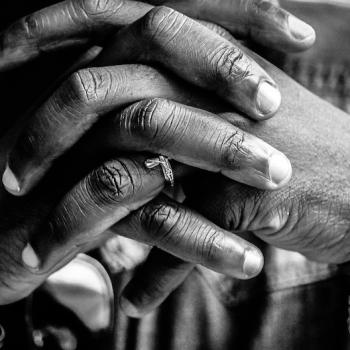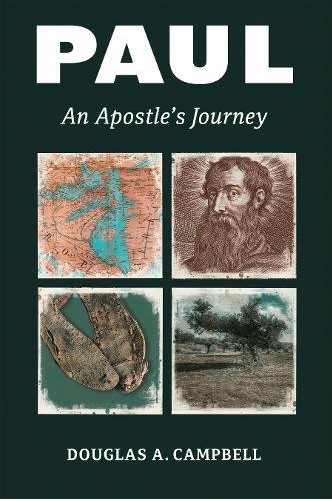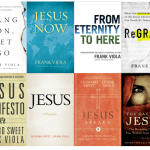 As we move through Lent and approach Easter it has become commonplace to have questions surrounding the historicity of the early Christian faith hit the news. This year James Tabor has once again hit the news (complete with forthcoming book and Discovery Channel “documentary”) with the purported discovery of a first century tomb in Jerusalem dated between 20 and 70 CE with Christian symbols and phrases inscribed on ossuaries. The tomb is located near the “Jesus Tomb” he hit the news with about five years ago. The latest claim has been met, primarily, with deep skepticism and a wait and see attitude. Dr. Tabor has not exactly endeared himself to his professional colleagues (sensationalists rarely do). MSNBC had a couple of posts (New Find Revives ‘Jesus Tomb’ Flap and Doubts About ‘The Jesus Discovery’).
As we move through Lent and approach Easter it has become commonplace to have questions surrounding the historicity of the early Christian faith hit the news. This year James Tabor has once again hit the news (complete with forthcoming book and Discovery Channel “documentary”) with the purported discovery of a first century tomb in Jerusalem dated between 20 and 70 CE with Christian symbols and phrases inscribed on ossuaries. The tomb is located near the “Jesus Tomb” he hit the news with about five years ago. The latest claim has been met, primarily, with deep skepticism and a wait and see attitude. Dr. Tabor has not exactly endeared himself to his professional colleagues (sensationalists rarely do). MSNBC had a couple of posts (New Find Revives ‘Jesus Tomb’ Flap and Doubts About ‘The Jesus Discovery’).
Beyond the rather sensational however, Easter brings up a deep question for many. What ever you think of James Tabor and his new ‘sensational'(ized) find – and I will await the vetting and consensus of his peers before taking him seriously – it is interesting that the symbols he claims to have found point to the central Christian claim and hope of resurrection. Yet the resurrection seems too bizarre to be true, a strange ending to an otherwise interesting tale. It is something hard for rational modern people to take seriously. And the questions go beyond the rather straightforward “can a scientist believe the resurrection?” (for which there are fairly good answers as NT Wright and John Polkinghorne both point out) to the purpose of the resurrection in the story. A commenter on one of my posts a couple of weeks ago put it like this:
The death of Jesus sounds like such a great story of sacrificial love until the resurrection. What a disappointing turn of events! Who wouldn’t go through crucifixion if afterward they would be resurrected and given all power in the universe. It’s no longer about something mature like love but rather about power, and for the Christian being on the team that has all the power and access to eternal paradise. Such a story reminds me more of something I’d see on Saturday morning cartoons … forces of evil battling against the forces of good … than from a wise creator.
How would you answer this commenter?
Why is ‘Cross and Resurrection’ central to the Christian faith?
What does resurrection – so hard for modern people to accept – bring to the faith?
Clearly resurrection is central to the Christian faith. Paul makes this point with passion in his writing, especially in a passage we’ve touched on many times over the last several month:
For what I received I passed on to you as of first importance: that Christ died for our sins according to the Scriptures, that he was buried, that he was raised on the third day according to the Scriptures, and that he appeared to Cephas, and then to the Twelve. After that, he appeared to more than five hundred of the brothers and sisters at the same time, most of whom are still living, though some have fallen asleep. Then he appeared to James, then to all the apostles, and last of all he appeared to me also, as to one abnormally born. (1 Cor. 15:3-8)
This is the New Testament statement of the gospel, as Scot points out in his King Jesus Gospel. But the claim of resurrection was controversial from the very beginning. Paul, writing to “the church of God in Corinth, to those sanctified in Christ Jesus and called to be his holy people”, not preaching to unbelievers or those not yet in the church, finds it necessary to emphasize the importance of resurrection.
But if it is preached that Christ has been raised from the dead, how can some of you say that there is no resurrection of the dead? If there is no resurrection of the dead, then not even Christ has been raised. And if Christ has not been raised, our preaching is useless and so is your faith. More than that, we are then found to be false witnesses about God, for we have testified about God that he raised Christ from the dead. But he did not raise him if in fact the dead are not raised. For if the dead are not raised, then Christ has not been raised either. And if Christ has not been raised, your faith is futile; you are still in your sins. Then those also who have fallen asleep in Christ are lost. If only for this life we have hope in Christ, we are of all people most to be pitied. (1 Cor. 15:12-19)
We have this passage in our bible (along with the rather confusing discussion of Adam and of spiritual bodies that follows) because Paul found it necessary to defend the resurrection when he was writing to The Church of God in Corinth, those sanctified in Christ Jesus, together with all those everywhere who call on the name of our Lord Jesus Christ.
It isn’t only Paul, and it isn’t only the church in Corinth. Matthew adds a defense of the resurrection to his gospel, countering a skepticism in the form of a story widely circulated, he tells us, among the Jews to the very day of the writing of the gospel.
While the women were on their way, some of the guards went into the city and reported to the chief priests everything that had happened. When the chief priests had met with the elders and devised a plan, they gave the soldiers a large sum of money, telling them, “You are to say, ‘His disciples came during the night and stole him away while we were asleep.’ If this report gets to the governor, we will satisfy him and keep you out of trouble.” So the soldiers took the money and did as they were instructed. And this story has been widely circulated among the Jews to this very day. (Mt 28:11-15)
But back to Paul who continues and concludes his thought in 1 Cor. 15 with certainty and confidence:
But Christ has indeed been raised from the dead, the firstfruits of those who have fallen asleep. (1 Cor 15:20)
The sting of death is sin, and the power of sin is the law. But thanks be to God! He gives us the victory through our Lord Jesus Christ. Therefore, my dear brothers and sisters, stand firm. Let nothing move you. Always give yourselves fully to the work of the Lord, because you know that your labor in the Lord is not in vain. (1 Cor. 15:56-58)
The revolutionary claim of resurrection is not peripheral to the Christian faith – something that can be accepted, rejected, or spiritualized. It is not that He lives within my heart but that He Lives whether hearts are receptive or not. And his death and resurrection accomplished something powerful.
In some sense, though, the claim of Paul at the end of this powerful passage in 1 Cor. 15 and elsewhere ( c.f. Phil. 2:5-11 and Romans 8:31-39) comes right back to the commenter I quoted above. This is a story of power. And resurrection is the victory over the power of sin and death. I don’t have a clear answer to give the commenter, and he is far from alone in asking such pointed questions. At this point I would like to open the post up for conversation and find out how others would answer these questions.
How is this resurrection part of the mature love of a wise creator?
Why is Cross and Resurrection central to the gospel of Jesus Christ?
If you wish to contact me directly, you may do so at rjs4mail[at]att.net
If interested you can subscribe to a full text feed of my posts at Musings on Science and Theology.















